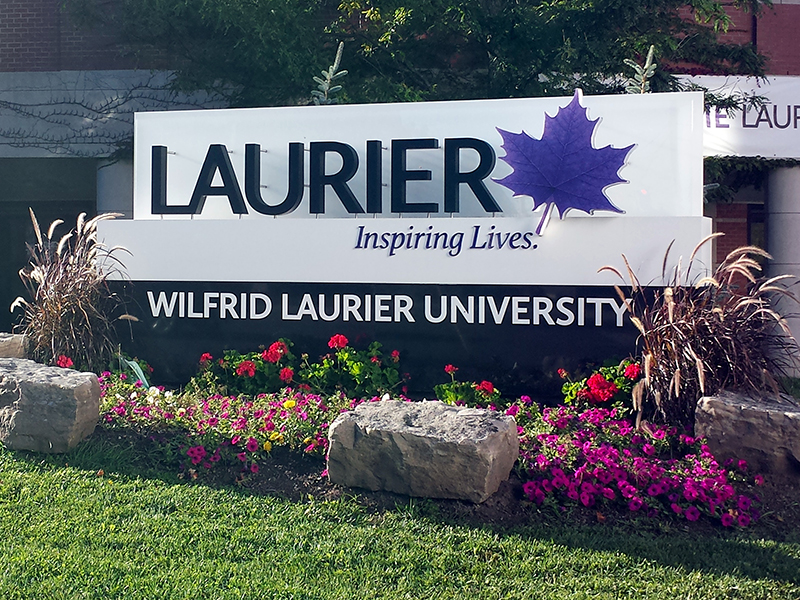Campus controversies are a dime a dozen, and the one that culminated in 300 people standing outside a Waterloo, Ont., auditorium on a chilly March evening followed the standard template. To wit: A student group invites a guest speaker to deliver a talk. The guest is “controversial” or “provocative” – vague adjectives that generally suggest proximity to racism without making the accusation outright. In the days leading up to the talk, there are protests by students who claim that the speaker is creating a hostile environment, but the university administration declines to intervene. Ultimately, the speaker is shut down, and a thousand eulogies for free speech are written.
In this most recent episode, the campus was Wilfrid Laurier University. The guest speaker was former Rebel Media personality Faith Goldy, whose “controversial” reporting included sympathetic coverage of the “alt-right” marchers at a rally in Charlottesville, Va., where an anti-racist protester was killed. Later, she appeared on the neo-Nazi Daily Stormer podcast, where she mused that the marchers’ views on the “Jewish Question” were “robust” and “well thought out.” Her scheduled talk at Laurier, titled “Ethnocide: Multiculturalism and European Identity,” was similarly “provocative.” University president Deborah McLatchy released a statement in which she made clear that Goldy’s belief that non-European immigrants pose a dire threat to Canadian culture does “not align with the university’s values,” but asserted that “Wilfrid Laurier University does not limit the peaceful and lawful expression of ideas.” In the end, it was a rogue fire drill that limited Goldy’s expression: the building was evacuated before she even began her talk.

Even by conservative standards, a commentator preoccupied with the threat of “white genocide” qualifies not just as controversial, but as racist. However, for the students attending Goldy’s talk, it was arguably the controversy, not the racism, that was the draw. VICE reporter Mack Lamoreux covered the event, where attendees told him that they were first alerted to Goldy’s talk by McLatchy’s statement and they wanted to see what kind of speaker would lead the university president to issue a disavowal. “Quite a few don’t even know who Goldy is,” Lamoreux observed. Lindsay Shepherd, the leader of the (unsanctioned) student group that extended the invitation, didn’t bother to defend her guest’s ideas. “I certainly do not share most of Faith Goldy’s views,” Shepherd said in an interview. “I actually don’t know where she stands on a lot of things.” Tellingly, Shepherd did not say which of Goldy’s views she did support, or even which of Goldy’s ideas she thought were worth engaging. Which raises the question: why give Goldy a platform at all? The title of the series of talks for which Goldy was the first invited speaker – “Unpopular Opinions” – provides a clue. That is, Goldy was invited not because her ideas were considered valuable, but because of a perceived consensus that they weren’t.
At Laurier, as well as at many other universities, there is a system in place whereby any student can invite anyone to say anything on campus. In order for an invitation to be withdrawn, opponents of “provocative” speakers must prove that the speaker shouldn’t be allowed to give a talk. But when even the guest’s sponsors don’t bother to mount a case for the ideas being given a platform, it is worth re-framing the question. Why should Goldy be allowed to talk at Laurier? What does she have to offer that makes her worthy of being associated with an institute of higher learning?
READ: HAVE SOME JEWISH GROUPS GONE TOO FAR BY TRYING TO SILENCE THEIR OPPONENTS?
Universities are not open mics; they are curators of knowledge. Students must apply to be admitted; hiring is competitive. The work produced by faculty members must survive the rigours of peer review before it enters the canon. University presidents are compensated generously for providing leadership and for upholding their institutes’ credibility. It is curious, at best, that this degree of quality control can be effortlessly circumvented by outsiders whose only selling point is their ability to provoke. And it is telling that freedom of speech overrides other considerations to such an extent that neither McLatchy, nor any other university president, has ever asserted: “We are an institute of higher learning. We have standards. They are established by our faculty and leadership, not by students. Associating with us is a privilege, not a right.”
Controversial speakers like Faith Goldy are parasites, leeching credibility from the institutions that host them. Without any ideas that even their supporters will defend, their goal is to provoke – and they achieve this whether they are granted platforms, or are banned. It’s time to stop playing their game. We can do that by abandoning the tired free-speech-vs-safe-space frame and instead talking about standards. For example, we could restrict visiting speakers to ones sponsored by faculty. We could, as Carleton University professor Stephanie Carvin suggests, “Have groups make the case for why a speaker should have a platform. Demonstrate the value that would be gained.”
A sober, “I’m afraid you don’t meet the standards of our academic institution, have a nice day,” issued by a leader tasked with protecting said institution’s reputation, may not be successful, but at least it wouldn’t feed the egos of speakers who thrive on opposition. In any case, it’s worth a try.
Brenda Fine lives in Vancouver and teaches post-secondary mathematics and statistics.






